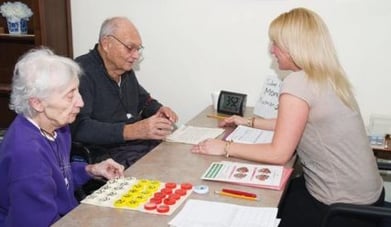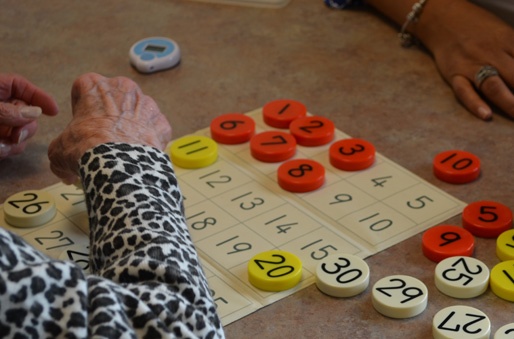Alzheimer’s disease and other forms of dementia are difficult to treat, but research is ongoing, and we learn more every day. And learning every day may just be one of the bases of better cognitive disorder therapies.
That’s the thought that researchers at Japan’s Kumon Institute of Education had when they developed the SAIDO Learning® system.
Effective memory care is exceptionally challenging to provide. Given that Alzheimer’s disease is the sixth leading cause of death in the United States, with an estimated 5.5 million new diagnoses every year, a rate expected to increase as the Baby Boomers reach senior maturity, we face a pressing need to find better treatments. SAIDO represents one of the most promising memory care methods we’ve seen to date.
Episcopal Retirement Services’ (ERS) Marjorie P. Lee retirement home has become the first senior community in the country to be licensed to implement SAIDO Learning, and it’s brought us tremendous hope that scientists are on the right track to figure out how to slow, halt, or even cure dementia in the future.
What is SAIDO Learning®?
SAIDO is a non-pharmacological treatment that has been shown to improve the symptoms of memory loss among older adults with dementia. It was the brainchild of Kumon Institute researchers and Professor Ryuta Kawashima of the Smart Aging International Research Center (SAIRC) at Tohoku University.
In the SAIDO system, a caregiver, or “Supporter,” works with two older adults, “Learners,” by engaging them in a series of precise, simple brain exercises. Some of the exercises are math-based, others are reading and writing exercises.
The exercises the Supporter provides are designed to stimulate the prefrontal cortex of the brain — the area associated with decision-making, complex cognitive planning, personality expression, and social behavior moderation. Many researchers believe that dementia-type disorders are caused by dysfunction in the prefrontal cortex.
Learning sessions last for half an hour and are conducted five times per week. According to SAIDO’s developers, “the object of the therapy is not to teach the material but to engage the Learner in the accomplishment of repeated successful exercises, progressing to new material at the Learner’s level and pace.”
As Learners proceed through the program, they develop more confidence and tend to show improvements in performance on standard cognitive function tests like the Mini-Mental State Examination (MMSE) and the Frontal Assessment Battery at Bedside (FAB).
SAIDO is now practiced in over 1,400 nursing facilities across Japan, and has been employed in the treatment regimen of more than 18,000 Japanese dementia patients. Now, ERS is among the first providers making the SAIDO Learning system available to patients in the United States.
Achieving meaningful results at Marjorie P. Lee
Even small improvements can make a world of difference.
After participating in SAIDO, one resident at Marjorie P. Lee began engaging again with people around her, responding “yes” and “no” to questions about her needs. Another dementia patient exhibited a more positive outlook, and he began to show more concern for the people around him.
SAIDO is a person-centered memory care approach, which means that it perfectly aligns with ERS’ mission to provide dignified, person-centered care to all our senior clients. It’s just one of several memory support therapies that we provide. And, as part of an ERS caregiver-led effort, we continue to seek and trial more.
We created a team consisting of nurses, administrators, programming specialists, spiritual caregivers, and social workers to look at what programs are out there and what programs have had the greatest success.
 The team’s goal was to identify memory care therapies that resonated with our residents and were user-friendly for staff members. SAIDO Learning was one of the programs the work group identified.
The team’s goal was to identify memory care therapies that resonated with our residents and were user-friendly for staff members. SAIDO Learning was one of the programs the work group identified.
SAIDO has improved the quality of life for our residents. Instead of the steady decline often seen with dementa, we have seen a slower rate of decline, and some individuals have stayed the same — a major success.
We can help your loved one, too
We’re excited about the possibilities SAIDO Learning offers our memory care patients. Moreover, we’re optimistic that we’ll continue to see the development of better methods for caring for patients living with Alzheimer’s, dementia, and other cognitive disorders.
If your loved one is in need of memory care in Cincinnati, we hope that you’ll download our Dementia Guidebook to learn more about the resources and support available to your family.













